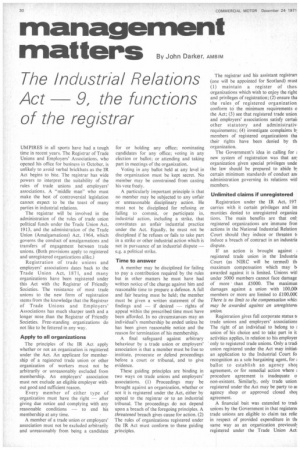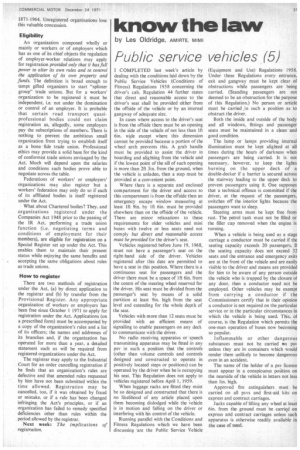management
Page 32

Page 33

If you've noticed an error in this article please click here to report it so we can fix it.
matters By John Darker'
AMEIM
The Industrial Relations Act 9, the functions of the registrar
UMPIRES in all sports have had a tough time in recent years. The Registrar of Trade Unions and Employers' Associations, who opened his office for business in October, is unlikely to avoid verbal brickbats as the IR Act begins to bite. The registrar has wide powers to interpret the suitability of the rules of trade unions and employers' associations. A "middle man" who must make the best of controversial legislation cannot expect to be the toast of many parties in industrial relations.
The registrar will be involved in the administration of the rules of trade union political funds under the Trade Union Act. 1913, and the administration of the Trade Union (Amalgamations) Act, 1964, which governs the conduct of amalgamations and transfers of engagement between trade unions. (Both provisions apply to registered and unregistered organizations alike.) Registration of trade unions and employers' associations dates back to the Trade Union Act, 1871, and many organizations have been registered under this Act with the Registrar of Friendly Societies. The resistance of most trade unions to the new form of registration Stems from the knowledge that the Registrar of Trade Unions and Employers' Associations has much sharper teeth and a longer nose than the Registrar of Friendly Societies. Free-standing organizations do not like to be fettered in any way.
Apply to all organizations The principles of the IR Act apply whether or not an organization is registered under the Act. An applicant for membership of a registered trade union or other organization of workers must not be arbitrarily or unreasonably excluded from membership. An employers' association must not exclude an eligible employer without good and sufficient reason.
Every member of either type of organization must have the right — after giving due notice and complying with any reasonable conditions — to end his membership at any time.
A member of a trade union or employers' association must not be excluded arbitrarily and unreasonably from being a candidate for or holding any office; nominating candidates for any office; voting in any election or ballot; or attending and taking part in meetings of the organization.
Voting in any ballot held at any level in the organization must be kept secret. No member may be constrained from casting his vote freely.
A particularly important principle is that no member may be subjected to any unfair or unreasonable disciplinary action. He must not be disciplined for refusing or failing to commit, or participate in, industrial action, including a strike, that constitutes an unfair industrial practice under the Act. Equally, he must not be disciplined if he refuses or fails to take part in a strike or other industrial action which is not in pursuance of an industrial dispute — e.g. a political strike.
Time to answer A member may be disciplined for failing to pay a contribution required by the rules but in other matters he must have had written notice of the charge against him and reasonable time to prepare a defence. A full and fair hearing must be held; the member must be given a written statement of the findings and — if desired — rights of appeal within the prescribed time must have been afforded. In no circumstances may an individual's membership be ended unless he has been given reasonable notice and the reason for termination of his membership.
A final safeguard against arbitrary behaviour by a trade union or employers' association is that a member must be Free to institute, prosecute or defend proceedings before a court or tribunal, and to give evidence.
These guiding principles are binding in two ways on trade unions and employers' associations. (1) Proceedings may be brought against an organization, whether or not it is registered under the Act, either by appeal to the registrar or to an industrial tribunal. The proceedings do not depend upon a breach of the foregoing principles. A threatened breach gives cause for action. (2) The rules of organizations registered under the IR Act must conform to these guiding principles.
The registrar and his assistant registrars (one will be appointed for Scotland) must (1) maintain a register of thos, organizations which wish to enjoy the right and privileges of registration; (2) ensure tha the rules of registered organization conform to the minimum requirements o the Act; (3) see that registered trade union and employers' associations satisfy certaii other statutory and administrativi requirements; (4) investigate complaints b: members of registered organizations tha their rights have been denied by th organization.
The Government's idea in calling for new system of registration was that an organization given special privileges unde the law should be prepared to abide b] certain minimum standards of conduct am administration governing its relations witl members.
Unlimited claims if unregistered Registration under the IR Act, 197 carries with it certain privileges and im munities denied to unregistered organiza tions. The main benefits are that onl: registered organizations are immune fron • actions in the National Industrial Relation Court should they induce or threaten t; induce a breach of contract in an industria dispute.
If an action is brought against ; registered trade union in the Industria Court (as NIRC will be termed) th maximum compensation which may b awarded against it is limited. Unions witl under 5000 members cannot face damage of more than £5000. The maximun damages against a union with 100,001 members or more are limited to £100,000 There is rw limit to the compensation whio may be awarded against an unregistered union.
Registration gives full corporate status u trade unions and employers' associations The right of an individual to belong to ; union of his choice and to take part in it activities applies, in relation to his employer only to registered trade unions. Only a taxi' union registered under the Act may initiati an application to the Industrial Court fo recognition as a sole bargaining agent, for ; ballot to establish an agency she,' agreement, or for remedial action where procedure agreement is inadequate o non-existent. Similarly, only trade union: registered under the Act may be party to at agency shop or approved closed shoi agreement.
A financial bait was extended to trad; unions by the Government in that registerer trade unions are eligible to claim tax retie in respect of provided expenditure in th; same way as an organization previousl; registered under the Trade Union Act: 1871-1964. Unregistered organizations lose this valuable concession.
Eligibility An organization composed wholly or mainly or workers or of employers which has as one of its chief objects the regulation of employer-worker relations may apply for registration provided only that it has full power to alter its own rules and to control the application of its own property and funds. The definition is broad enough to tempt gifted organizers to start "splinter group" trade unions. But for a workers' organization to be registered it must be independent, i.e. not under the domination or control of an employer. It is probable that certain road transport quasiprofessional bodies could not claim registration as, allegedly, some employers pay the subscriptions of members. There is nothing to prevent the ambitious small organization from trying to establish itself as a bona fide trade union. Professional ethics may provide a solid base for the kind of conformist trade unions envisaged by the Act. Much will depend upon the salaries and conditions such bodies prove able to negotiate across the table.
Federations of workers' or employers' organizations may also register but a workers' federation may only do so if each of its affiliated bodies is itself registered under the Act.
What about Chartered bodies? They, and organizations registered under the Companies Act 1948 prior to the passing of the IR Act, performing a trade union function (i.e. negotiating terms and conditions of employment for their members), are eligible for registration on a Special Register set up under the Act. This enables them to maintain their present status while enjoying the same benefits and accepting the same obligations about rules as trade unions.
How to register There are two methods of registration under the Act, (a) by direct application to the registrar and (b) by transfer from the Provisional Register. Any appropriate organization of workers or employers has been free since October l 1971 to apply for registration under the Act. Applications (on a prescribed form) must be accompanied by a copy of the organization's rules and a list of its officers; the names and addresses of its branches and, if the organization has operated for more than a year, a detailed statement such as will be required from registered organizations under the Act.
The registrar may apply to the Industrial Court for an order cancelling registration if he finds that an organization's rules are defective and that amended rules requested by him have not been submitted within the time allowed. Registration may be cancelled, too, if it was obtained by fraud or mistake, or if a rule has been changed infringing the Act's principles, or if an organization has failed to remedy specified deficiencies other than rules within the period allowed by the registrar.
Next week: The implications of registration.




































































